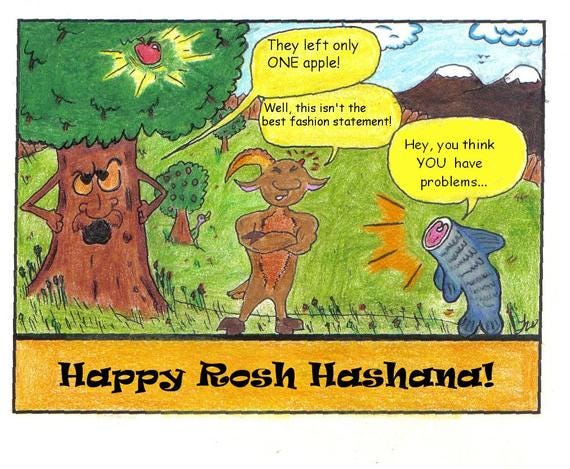Rosh Hashanah is not the “Jewish” New Year. It’s the New Year for all humanity and, indeed, all life. As the Talmud teaches, “On Rosh Hashanah, all inhabitants of the world pass before Him like a flock of sheep.” (Rosh Hashanah 18a). Or as we say in the High Holiday liturgy, “As a shepherd herds his flock, causing his sheep to pass beneath his staff, so do You cause to pass, count, and record, visiting the souls of all living, etc…”
This is for one very simple reason.
The Torah doesn’t believe you have to be Jewish to be worthy of G-d’s love.
On the contrary, the festival which evolves from Rosh Hashanah - Sukkot - features no less than 70 ceremonies where we pray for the individual success and happiness of the 70 nations of the world (Talmud Sukkah 55b). Rosh Hashanah itself commemorates the creation of Adam, the very first human being(Vayikra Raba 29:1). And the Lubavitcher Rebbe stressed that this is so all humanity “…everywhere and at all times, should know that each and all descend from the one and the same single progenitor, a fully developed human being created in the image of G‑d, so that no human being could claim superior ancestral origin; hence would also find it easier to cultivate a real feeling of kinship…”
If this is the case, why is the source for Rosh Hashanah a commandment given specifically to the Jewish people, as it states "Speak to the children of Israel saying: In the seventh month, on the first day of the month, you shall have a Sabbath, a memorial of blowing the horn, a holy gathering (Leviticus 23:23-24)”?
The answer, once again, is as simple as it is critical. The Jewish people are chosen to receive the Torah & share it with humanity, to be a “light unto the nations” (Isaiah 49:6). This is why Maimonides states that G-d gave Moses the laws for all humanity, the “7 Laws of Noah”, at the SAME time and in the SAME place as the laws for the Israelites (See Likkutei Sichot, Vol. 26, pp. 132–144). In other words, the commandments we received are not equal but equitable and our destinies are interconnected. As the Rebbe told Mayor David Dinkins, “We are one side, one people.”

On Rosh Hashanah, we pray for a Happy New Year for all humanity, for peace and prosperity for everyone. And we remind ourselves that our prayers can only be heard when we pray like King Solomon who was chosen to build the Holy Temple of Peace to be G-d’s “…house of prayer for all peoples.” (Isaiah 56:7).
But it’s so much more. Rosh Hashanah is a time when we remember that this is our responsibility. We must ensure that through us “…shall be blessed all the families of the earth” (Genesis 28:14). We must ensure that every neighbor, colleague, and friend realizes their G-d-given ability to be pious, to be good, to be righteous. For, through this, we ensure the day will come when all humanity will live in unity and together “…will call upon the name of G-d and serve Him with one purpose” (Zephaniah 3:9).
This is what the Avritcher Rebbe, the disciple of the holy Rebbe Levi Yitzchak of Berdichev, taught on the verse “You shall take for yourselves on the first day” (Leviticus 23:40). That it is the task of the Jewish people to inspire all of creation to follow in the footsteps of Adam who, created on the first day of Rosh Hashanah, said, “Come, let us bow down; let us bend the knee before G‑d our Maker” (Psalm 95:6).
In other words, we can’t do this alone. We need each other. To pursue justice. To civilize the world. To become partners with G-d in creation itself.
This is what will make the world sweet.
And this is what will bring Moshiach, Amen!




